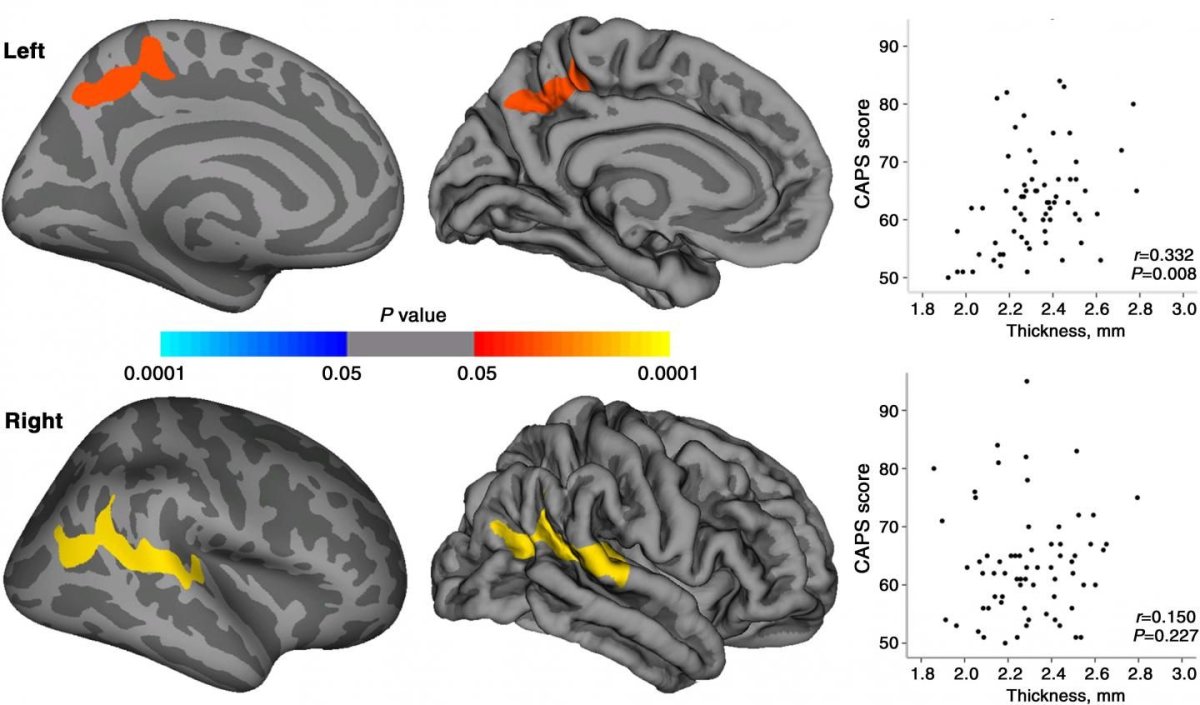
Some degree of stress is a fact of life, but not all stress is created equal. Following a traumatic event, nearly 7 percent of Americans will have nightmares, physical pain, inability to concentrate and worse. Their debilitating stress is categorized as post-traumatic stress disorder (PTSD) and costs them time away from work and the people and things they love.
Chinese researchers studied survivors of one of the most stressful encounters on Earth: a devastating earthquake. They set out to learn if the brains of quake survivors with diagnosed PTSD were different from the brains of those without the disorder in order to improve diagnosis and treatment for trauma survivors in general. Results published March 1 in the journal Radiology indicate that survivors of severe earthquakes who suffer PTSD have increased cortical thickness in certain regions of the brain and reduced volume in other regions compared with survivors without PTSD.
More than 4,000 survivors of massive earthquakes were screened for inclusion in the study based on whether they had experienced direct exposure to an earthquake and had suffered medical injuries or witnessed death from the disaster. The reason the research team focused on earthquake survivors is because they wanted to compare people who had similar exposure to trauma. "It is particularly important to compare PTSD patients to similarly stressed individuals in order to learn about the specific brain alterations directly related to PTSD that occur above and beyond general stress responses," says the study's senior author, Dr. Qiyong Gong of Huaxi MR Research Center at West China Hospital of Sichuan University in Chengdu, China.

Sixty-seven patients with PTSD who had not yet received medical treatment and 78 healthy survivors were recruited, and underwent MRI scanning. The survivors with PTSD had changes in both the gray matter and white matter tissue that make up the central nervous system. Gray matter is found in the surface area of the brain known as the cerebral cortex and is believed to help process information. White matter is found in the deeper, subcortical, tissues of the brain and is thought to relay sensory information from the rest of the body to the cerebral cortex.
In addition, the left precuneus region of the brain, known to be critical to visual processing, was found to be strongly correlated with cortical thickness among survivors with PTSD. That could account for a neural change that may cause those who suffer from PTSD to experience visual flashbacks, according to Gong.
Perhaps most importantly, the researchers found that "early in the course of PTSD, gray matter changes were in the form of increased rather than decreased cortical thickness, as opposed to most reported observations from other studies of PTSD," says Gong. "This might result from a neuroinflammatory or other process that could be related to endocrine changes or a functional compensation." These last findings may help further the medical community's understanding of changes in the brain that occur early on after exposure to trauma: by looking for these markers, clinicians could, in the future, more easily identify trauma survivors who are likely to develop persistent PTSD.
Uncommon Knowledge
Newsweek is committed to challenging conventional wisdom and finding connections in the search for common ground.
Newsweek is committed to challenging conventional wisdom and finding connections in the search for common ground.
About the writer
To read how Newsweek uses AI as a newsroom tool, Click here.








